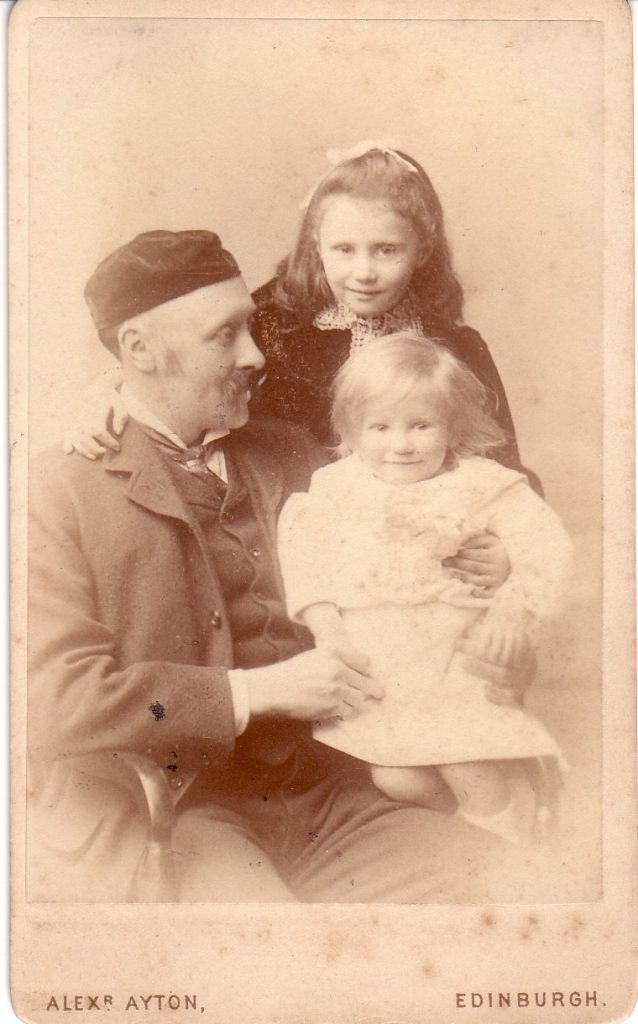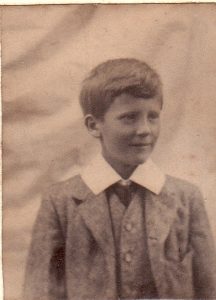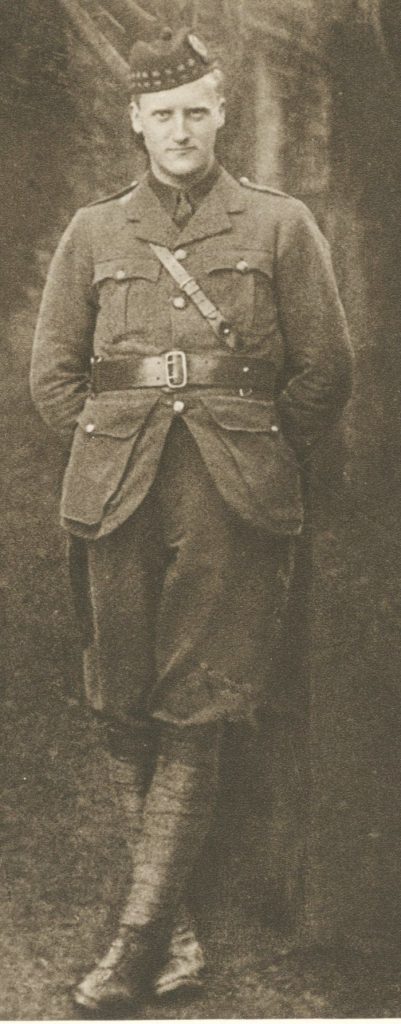
Regius Keeper Isaac Bayley Balfour with his daughter Senga and 1 year old son Isaac, known as ‘Bay’. Original photo in possession of a member of Balfour’s family.
During the initial few months of the First World War 56 men out of a total male staff of around 88 at RBGE enlisted, rising to 73 by the end of the War. Isaac Bayley Balfour was RBGE’s Regius Keeper throughout the War years and it must have been devastating for him and the remaining staff to hear of injury and losses amongst their colleagues fighting overseas. In June 1915 however, Balfour suffered a more personal blow – the death of his son, also named Isaac Bayley Balfour, or ‘Bay’ for short, in Gallipoli.
Four months later he wrote to the plant collector Reginald Farrer:
Dear Farrer,
Some sorrows have put me out of my stride and upset the equilibrium of life to the extent of bringing other matters than scientific so much within the sphere of immediate duty that during these past summer months I have not attended to your collections and letters as in normal times I should have had so much pleasure in doing…”
I.B.Balfour to R.Farrer, 23 Oct 1915 (RJF/1/1/1/34)
Bay was born to Isaac Bayley Balfour and his wife Agnes on the 19th October 1889, the year after Balfour became Regius Keeper at RBGE, meaning Bay would have spent his childhood with older sister Senga in Inverleith House within the Garden grounds, at that time the Regius Keeper’s residence. He attended Winchester College between 1903 and 1908, before enrolling at Magdalen College, Oxford where he took up art, intending to be a professional portrait painter. He must also have had a connection with Edinburgh University (perhaps the fact his father was Professor of Botany there? – addition – we now know he attended the College of Art) as he appears in their Roll of Honour, albeit in a section after the initial list of names. Here it is stated that Bay was trained by the University’s Officer Training Corps between September and November 1914, before being gazetted to the 14th Royal Scots on the 14th January (The Scotsman), a Home Regiment, quickly becoming a Lieutenant, before becoming attached to the 1st King’s Own Scottish Borderers (KOSB) and being sent to Gallipoli in April 1915.
As part of the 87th Brigade of the 29th Division, Lieutenant Balfour would have played a prominent part in the three Battles of Krithia, fought between April and June, intended by the Allies to take control of the village of Krithia in the Gallipoli Peninsula, and the nearby hill top position at Achi Baba. By the end of June 1915 the military objectives had been changed to the theoretically more achievable ambition of taking the first opposing trenches across No Man’s Land, and of making slow but sure progress along the peninsula. This was the aim of the Battle of Gully Ravine, initiated on the 28th June 1915. It was on this day that Bay Balfour was killed, leading his troops over the top of the KOSB trenches on the Gully Spur into battle at 11am after a two hour artillery bombardment of the Turkish trenches. His grave can now be found at the nearby Twelve Tree Copse cemetery.
Bay’s former College at Winchester has an excellent website commemorating their former pupils who served in the Great War. On it I found the following information, and was also sent some extra information, such as the poem below, by the College’s archivist Suzanne Foster, who has kindly given me permission to edit and reproduce it here, along with their photograph of Bay:
The news of Balfour’s death came as a shock to his best friend…, Archibald William Robertson Don, who was himself later to die of malaria on active service in Salonika. Don confided to his diary: “July 8th 1915 Bay has been killed in action. These last few days I have been thinking of him constantly… I was looking at old letters, and re-read all his. it is hard to be losing one by one all these irreparable friends. It has been a day such as Bay delighted in, and that at first made it harder… Thank goodness he had hills and sky and flowers and things in Gallipoli. He wrote about it all quite happily when last they heard, and he had had one of my letters, which is a sort of comfort.”
The death of Bay Balfour also deeply upset Balfour’s friend Alexander Douglas Gillespie (…Argyll and Sutherland Highlanders, himself killed in action, September 25th 1915). He heard of it on July 11th: “This has been a black day for me ever since I saw Bay Balfour’s name in the lists from the Dardanelles. I can remember him so well as I first saw him, on that hot July day outside school at Winchester, before he and I went in to do our papers at the same table. We went up the school together all the way, and he was always the life of every class. And at Oxford I came to know him even better, until latterly he was in many ways my greatest friend. He was the most lovable of men – so lively and full of zest and joy in living that he made all his friends feel glad to be alive. He had a strong character too, with all his charm – for all his popularity at school left him quite unspoilt. He managed his house splendidly, and whatever he decided to do, he would have done well; but he never could have painted a better picture than his own five and twenty years, for there is nothing in them that any of his friends would ever wish to forget. I have written to Mrs. Balfour, but didn’t know what to say; he was the sunshine of that house. If only we could have done our training this last winter together – somehow I was afraid that I should never see him again. This is no letter, but I can think of nothing but Bay Balfour. The world is a poorer place without Tom [Gillespie’s younger brother, killed in action in 1914] and Bay Balfour, and I do feel that, if it wasn’t for all of you at home, I should be quite content to follow them. If ‘getting used to it’ means that one slowly forgets how much there was to love in them, I would rather keep the pain for ever. Perhaps Daisy would show you some verses I wrote about Bay Balfour; afterwards I worked at them until I made them rather better, but still not nearly good enough.”
The poem appeared in The Wykehamist (544, July 1915):
I.B.B. – 1903-1915
Twelve years ago, that hot July,
We walked together, you and I,
From Flint Court into School,
to show How much and little t’others know.You smile at me. I seem to live
Through each long hour in every Div.;
You whisper, and I watch you rise
With mischief dancing in your eyes.Your coat was gray as Magdalen Tower:
I see you, at each sounding hour,
flit through the winding Oxford street
With tattered gown and eager feet.A year ago last June, we walked
The Highland hills, and bathed, and talked
Of everything beneath the sun,
And all our races yet to run.July is come again – but you
Have done all that a man can do.
You loved your friends, and will not want
Companions by the Hellespont.For your brave spirit wanders free
To islands in that summer sea,
And your light feet will pass with joy
Across the windy plains of Troy:And all the heroes Homer sung,
Hector, Patroclus ever young,
And Nireus with the flowing hair,
Will smile to give you welcome there,And weave into another lay
Your golden deeds of yesterday,
For half the tale was left unsaid
Until you shone among the dead.Then, swift as thinking, you will come
To Flanders, where the bullets hum:
Your spirit will come to mine and tell
My loneliness that all is well;Yes! to the friend who knows his friend
And knows himself, Death’s not the end,
And every day until I die
We’ll walk together, you and I.A.D. Gillespie, from the trenches, July 1915
Click here for Bay’s obituary from the Winchester College at War web page.
Click here for Bay’s entry from the University of Oxford’s Magdalen College Great War database with its very detailed summary of his family, education and military service.
Click here for Bay’s entry in the Edinburgh University Roll of Honour.
With thanks to Suzanne Foster and the Winchester College Archives for permission to use their material in this blog post, and to members of the Balfour family for providing copies of their photographs and their support over the years.
The book ‘Gully Ravine: Gallipoli’ by Stephen Chambers, Pen & Sword Books Ltd, 2003 was used to research the Battle of Gully Ravine, 28th June 1915.



1 Comment
1 Pingback